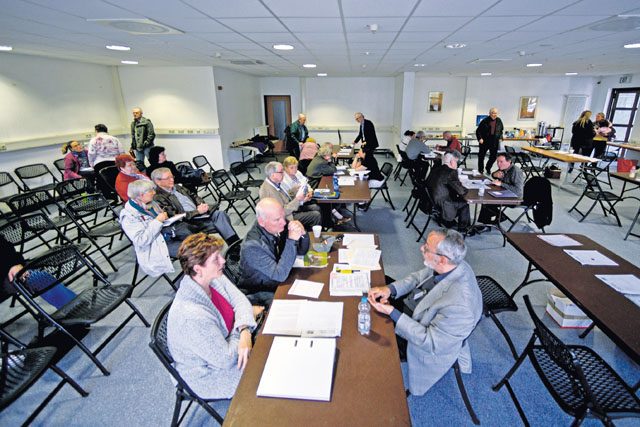
A military career can come with tremendous personal sacrifice, not just for service members but also for spouses. Not only do partners support their husbands and wives during their military service but after as well. When a retiree passes away, spouses are left with a plethora of responsibilities in addition to dealing with the loss of their loved one.
To alleviate some of the stress associated with such a tragic experience, the Kaiserslautern Military Community Retiree Counsel hosted the first Surviving Spouses Workshop April 16 on Ramstein.
“A lot of our retiree spouses are not aware of some of the required paperwork that is involved,” said Robert Belt, 86th Airlift Wing Retiree Activities Office volunteer. “Quite often, older couples were told, more than 40 years ago, that they shouldn’t worry about it and that the military would take care of everything. This is a myth. They will take care of a lot, but they won’t take care of everything. Without a DD Form 214, they can hardly do anything for the retiring spouse.”
The most important documents for spouses to have are the DD Form 214 and a death certificate, Belt said.
According to L.D. Pratt, a retired U.S. Army chief warrant officer, the workshop was long overdue.
“This is something we have needed for a very long time,” Pratt said. “I had to take care of my son’s estate, who passed away five years ago, and it has taken those five years to get everything closed out. People don’t take care of their (paperwork), and their (spouses) don’t understand in all cases. A lot of people don’t know what to do, and if they do, they keep putting it off.”
Not only was it a good wake-up call for spouses and military members to take action sooner rather than later but also to make sure paperwork is not just saved digitally.
“I am a spouse that is a dinosaur with computers,” said Patricia Rodriguez, a spouse who attended the event. “I didn’t have much knowledge, and if something happened to my husband, I would be (in trouble). After this workshop I will not be in that position. My husband now knows what he needs to do to help his family if anything were to happen to him. It is important to not only have digital copies but hard copies of paperwork in case it crashes.”
During the workshop, speakers from the Air Force and Army mortuary affairs and casualty assistance offices, Department of Veterans Affairs, U.S. Army Community Service survivor outreach service and a speaker from the 86th Airlift Wing Legal Office spoke to the attendees about things they would need to have and what their entitlements were.


